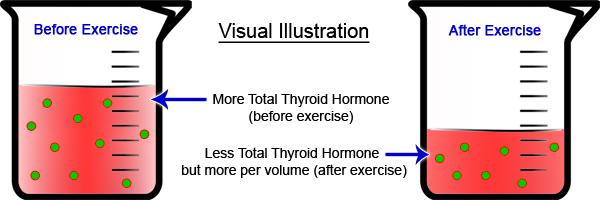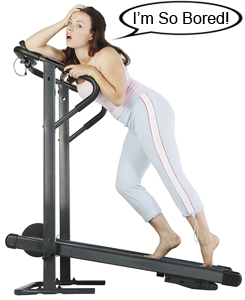Walking Burns More Calories Than Running?
Written by Tom Brimeyer | Posted in Exercise | 16 Comments
 When it comes to exercise, there’s a lot that we don’t understand. While everyone is led to believe that exercise is something that is always beneficial for our health, if you suffer from hypothyroidism, then exercise can quickly become dangerous and pose a serious risk to your thyroid and health.
When it comes to exercise, there’s a lot that we don’t understand. While everyone is led to believe that exercise is something that is always beneficial for our health, if you suffer from hypothyroidism, then exercise can quickly become dangerous and pose a serious risk to your thyroid and health.
This has become a very serious problem because so many hypothyroidism sufferers are incorrectly and dangerously using exercise as a means of trying to control their weight.
You can’t blame yourself though because everyone, even your doctor who is supposed to actually know what is best for your health, tells you that you need to exercise to lose weight and get healthy. But, when nobody stops to actually look at and understand the physiology of the body and how exercise impacts your entire hormonal system (thyroid included) that’s when you end up getting yourself into big trouble.
Yes, I understand that society today is obsessed about weight loss and the ridiculous idea that simply losing weight is the solution to all of our health problems. If that were true then why are so many non-overweight people suffering from hypothyroidism, cancer, autoimmune disease, heart disease, and every other disease for that matter?
In fact, I work with a number of clients who are severely hypothyroid and underweight.
If we would take a minute to step back and look at the big picture then we could begin to see that exercise isn’t always healthy, and in fact, can be quite thyroid suppressive and dangerous to your health.
A large part of the problem can be attributed to our poor interpretation of research, lack of knowledge, and a lack of understand of the human body.
While I will cover some of the dangers of exercise as it relates to hypothyroidism a little later, the purpose of this article is really to open your mind so that you can understand how little we really do understand when it comes to exercise.
So, I’m going to discuss a couple of very common exercise myths just so show you how little we really do know.
Myth #1 – Exercise Improves Thyroid Function
If you look at the current research, a lot of people are incorrectly led to believe that exercise improves thyroid function. There are studies where they have taken blood samples immediately before and then immediately after exercise in order to analyze the amount of thyroid hormone in the blood. Many of these studies have found that some forms of exercise cause an increase in blood level thyroid hormone, and so they interpret this as evidence that exercise improves thyroid function.
It’s time to celebrate, right? Not quite…
Using a basic understanding of cell physiology, when cells become fatigued or overworked, they take up more water. This is a natural response to stress. So, when you exercise, as your muscles fatigue, they can take up a significant amount of water. As water is pulled from your bloodstream and into your cells, this effectively decreases blood volume.
If blood volume is decreased then of course the concentration of thyroid hormone will increase but only because there is less blood and not because there is more thyroid hormone. If you to take this into account, the total amount of thyroid hormone actually decreases. And these researchers fail to account for this loss of blood volume that exercise causes.

There’s also a lot of research that demonstrates this as well.
For example, one mechanism that is well known is that stress, including exercise, inhibits the conversion of inactive T4 thyroid hormone to active T3 thyroid hormone by the liver…
The effect of acute exercise session on thyroid hormone economy in rats
http://joe.endocrinology-journals.org/content/198/2/347.abstract
“T3/T4 ratio was significantly decreased 60 and 120 min after the exercise, indicating impaired T4-to-T3 conversion.”
And there are plenty of studies showing the negative effects of exercise on thyroid hormone as well…
The effect of exhaustion exercise on thyroid hormones and testosterone levels of elite athletes receiving oral zinc.
http://www.ncbi.nlm.nih.gov/pubmed/16648789
CONCLUSION: Findings of our study demonstrate that exhaustion exercise led to a significant inhibition of both thyroid hormones and testosterone concentrations…
And this one which also demonstrates a decrease in resting metabolism…
Endurance training with constant energy intake in identical twins: changes over time in energy expenditure and related hormones.
http://www.ncbi.nlm.nih.gov/pubmed/9160814
“Resting metabolic rate (RMR) was significantly decreased by 8% after training despite the preservation of fat-free mass (FFM). Accordingly, plasma norepinephrine (NE) concentrations, NE appearance rate, and plasma levels of triiodothyronine (T3), free T3, and total thyroxine (T4) were lower after training.”
There are lots of studies that show the same exact results, but I think you get the point.
Forcing yourself to exercise as a means of losing weight or trying to “boost” your metabolism can actually have the opposite effect and result in the further suppression of your thyroid, a slower metabolism, and ultimately more future weight gain.
Sounds kind of counter-productive, right?
Myth #2 – Running Burns More Calories than Walking
This is one of my favorites because it goes to show you how far behind we are when it comes to our understanding of exercise and physiology.
The media, your doctor, your next door neighbor and everyone else who still has a bit of sanity left will tell you that running is one of the best ways to burn calories and lose weight?
Running is far better than walking, right?
Yes, you can read this in any exercise physiology book, but there’s something big that they’ve all forgotten to take into account…
Your brain!
When exercise physiologists study energy expenditure and derive their energy calculations, they fail to account for the brain in their calculations. And your brain produces huge amounts of energy and requires a huge amount of fuel.
Just because you’re running on a treadmill doesn’t mean that your brain shuts off and stops working. It’s still working and expending energy, just like your muscles.
 Russian physiologists on the other hand are accounting for the brain. And by stimulating the brain and therefore increasing its energy expenditure, your brain can burn significantly more calories.
Russian physiologists on the other hand are accounting for the brain. And by stimulating the brain and therefore increasing its energy expenditure, your brain can burn significantly more calories.
So, stimulating your brain while you walk can actually be more beneficial than running on a treadmill while your brain is minimally stimulated. If you take into account that walking would be far less damaging to your thyroid and metabolism, you can effectively support your thyroid and burn more calories on average from walking in a mentally stimulating environment than running while bored.
The bottom line is that our current understanding of exercise and physiology is severely lacking and it’s only further contributing to our general declining state of health today. And in today’s world, your thyroid really does need all the help it can get.
Millions of people today are not only hypothyroid, but are also making their hypothyroidism worse by following all of the bad advice out there. When millions of people are led to believe that something like exercise is always beneficial to their health, while it’s unknowingly causing more damage to their thyroid, then we really have an epidemic problem.
Hopefully this opens your eyes up to the fact that exercise, as it relates to hypothyroidism, is something that needs much more attention if we are ever going to make real progress in properly understanding and treating hypothyroidism.












LUIS BENTO
15. Oct, 2012
GOSTAVA IMENSO DE LER OS SEUS ARTIGOS EM PORTUGUES E SABER MAIS SOBRE OS SEUS PRODUTOS EM PORTUGUES.
JaneG
15. Oct, 2012
I read stories of people who are hypothyroid that are able to do aerobics or run. I have no idea how they have the energy to do that! I have found that yoga helps me to not only stay fit, it is slow enough to not exhaust me, it is “my practice” (in other words, do what you can do, you don’t have to push yourself like aerobics or running). It reduces my stress level, reduces inflammation throughout mu body, not to mention the benefits of the mind/body connection. And there are several poses in basic yoga that are good for the thyroid. http://www.yogajournal.com/poses/finder/anatomical_focus/thyroid
racerwife7
08. Sep, 2013
We can do that because our thyroids are properly managed BEFORE we start an exercise routine. A big part of the thyroid problems people experience even after dx is due to doctor ignorance about proper thyroid treatment. A huge majority of doctors STILL insist on prescribing crap T4-only medications (like Synthroid or Levoxyl) and then they treat the patient’s lab reports rather than the person.
No WAY I could’ve been a runner before I found this out. Now, I’m on natural dessicated thyroid (Armour brand) and I’m taking triple the dosage compared to the minute dosage of Levozxyl I used to be prescribed by a supposed “specialist”. I’m happier, healthier, in both body and mind than I have been in years AND… I’M A RUNNER in training for my 2nd half marathon.
Rachel
15. Oct, 2012
Is aerobics with light weights good for losing or maintaining weight for hypothyroidism?
Tom Brimeyer
15. Oct, 2012
Any sort of “breathless” exercise or exercise that causes you become out of breath is no good. When exercise becomes breathless, it’s a sign that your metabolism is shifting to a more unhealthy and thyroid suppressive state.
Irene Reyes
15. Oct, 2012
I had my thyroid removed two years ago. What type of exercise should I do? Swimming, light weights, zumba?
Donna
15. Oct, 2012
Tom, what is your recommendation for the “right” kind of exercise for people with hypothryoidism?
Tom Brimeyer
15. Oct, 2012
I’ll be sending out info on that tomorrow.
Ginny
15. Oct, 2012
I really miss Weight Lifting and Zumba classes but have adjusted to a lifestyle without them. I love my Yoga classes but even they can be too exerting and I have to back off. I would love to know what my body wants me to do!
Tom Brimeyer
15. Oct, 2012
Hi Ginny,
Don’t let me forget, we can discuss exercise during our consult tomorrow. I have something that will answer all of your questions.
Diana
16. Oct, 2012
Brain Stimulating Exercise for me is taking the dogs for a walk – Try walking two dogs at a time, this is very briain stimulating and positivly a joyfull experience for both me and the dogs. My most recent discovery on how to work it into my life is – My husband like to have me go with him to the Home Depot, but he takes FOREVER in there – sometimes hours, so I have incorporated bringing the dogs and then I do a couple of laps outside the store perimiter – the no stopping kind (except for emergencies).
Pradeep Kumar
17. Oct, 2012
Tom,
I read your blogs with great interest and usually don’t comment because they make sense…but this one got me. Are you saying that the brain burns a significant amount of calories compared to muscle fiber? Can you present some data? I know you used to be an engineer and so was I , so lets talk numbers… : )
Thanks
Pradeep
Tom Brimeyer
18. Oct, 2012
That’s part of the problem. You can use the energy calculations that they use in the western exercise physiology texts but they aren’t correct because there are a number of variables that they are not accounting for, the brain being one. But you can also consider all of the other organs/glands as well… When metabolic demands increase, they do so for the entire body, not just muscle fibers. And as I mentioned, if specific exercise decreases the overall metabolic rate, i.e. as demonstrated in the twin study I presented, then you have to take that into account as well.
golnaz
22. Nov, 2012
i am doing yoga once a week, but i have walking periods in a day. i cant lose weight easily! what shall i do to lose weight?
Martin
11. Feb, 2013
Hi Tom. I want to ask If you know Dr. Rosedale and his book Rosedale diet (He is expert on aging and hormone leptin)? If so, you know that lower level of free T3 and lower body temperature doesn´t mean immediately bad news and hypothyroidism. For most people yes, but no for all, because it can mean that your body is in “preserving mode” what extends life. Rosedale diet is high-fat, low-carb diet with adequate amount of protein (1g for 1kg Lean Body Mass). Despite fact that this diet cause lower body temperature and lower free T3, so it is good state. Then, your thyroid and metabolism is very healthy and your energy is very high, because you have perfect metabolism. It´s how work Rosedale diet, it doesn´t increase metabolism, but making it better.
chris
15. Dec, 2013
I had thyroid cancer in April and had my whole thyroid removed, I have gained 20 lbs. and can’t seem to drop the weight. Any exercises or tips would be so helpful, Thanks!